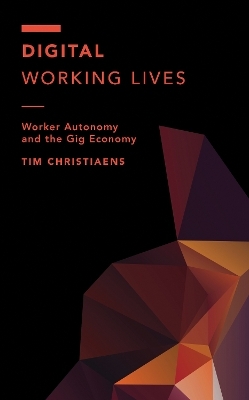
Digital Working Lives
Rowman & Littlefield (Verlag)
978-1-5381-7380-0 (ISBN)
Recent innovations in digital technologies are fundamentally transforming the world of work. A digital gig economy is emerging that threatens to displace traditional labour relations based on legally regulated labour contracts. Companies like Uber, Deliveroo, or Amazon Mechanical Turk rely increasingly on ‘independent contractors’ who earn piece-rate wages by completing tasks sent to them via their smartphones. This development understandably pushes workers to desire more autonomy, but what would workers’ autonomy mean in the digital age?
This book argues that the digital gig economy undermines workers’ autonomy by putting digital technology in charge of workers’ surveillance, leading to exploitation, alienation, and exhaustion. To secure a more sustainable future of work, digital technologies should instead be transformed into tools that support human development instead of subordinating it to algorithmic control. The best guarantee for human autonomy is a politics that transforms digital platforms into convivial tools that obey the rhythm of human life.
Tim Christiaens is assistant professor of economic ethics at the Department of Philosophy of Tilburg University in the Netherlands. His research focuses mainly on contemporary economic issues, such as financialization, socio-economic exclusion, and the digitalization of work, viewed through Italian and French critical theory (Foucault, post-workerism, Deleuze, Agamben). His research has been published in journals like Theory, Culture & Society, Philosophy & Social Criticism, Critical Sociology, and European Journal of Social Theory.
1. The Creeping Uberization of Work
1.1 What is the Digital Gig Economy?
1.2 Post-Workerism and the Struggle for Workers’ Autonomy
1.3 Toward Convivial Autonomy in the Digital Gig Economy
2. Governing the Workforce: From the Factory to the Digital Gig Economy
2.1 The Industrial Factory under Fordism
2.2 The Age of Post-Fordism
2.3 The Role of Digital Technology in the Post-Fordist Corporation
2.4 Conclusion
3. Exploitation and the Capture of Social Cooperation
3.1 Against the “Free Labour”-Thesis
3.2 The Becoming-Rent of Profit
3.3 Digital Capture and Enclave Rent
3.4 Digital Capture and Financial Rent
3.5 Conclusion
4. Alienation in the Platform Economy
4.1 The Ambivalence of the General Intellect
4.2 Alienation and the General Intellect
4.3 Conclusion
5. The Human Limits to Growth
5.1 Marx on the Problem of Fatigue
5.2 Digital Connection and Fatigue in the Digital Gig Economy
5.3 The Hidden Abode of Social Reproduction
5.4 Conclusion
6. Workers’ Autonomy as Self-Valorisation?
6.1 Autonomy as Self-Valorisation
6.2 Objections to Negri’s Notion of Workers’ Autonomy
6.3 Conclusion
7. Workers’ Autonomy as Conviviality
7.1 Ivan Illich as a Degrowth Thinker
7.2 Illich’s Critique of Modern Technology
7.3 Toward a Definition of Convivial Autonomy
7.4 Conclusion
8. Towards Convivial Platform Labour
8.1 Rekindling the Promise of the Sharing Economy
8.2 Preliminary Criticisms
8.3 Fostering a Community of Platform Artisans
8.4 Workers’ Independence and Labour Rights
8.5 Collective Self-Determination and the Library of Basic Protocols
8.6 Resonance and Grassroots Solidarities
8.7 Coda
| Erscheinungsdatum | 02.04.2024 |
|---|---|
| Verlagsort | Lanham, MD |
| Sprache | englisch |
| Maße | 152 x 227 mm |
| Gewicht | 272 g |
| Themenwelt | Geisteswissenschaften ► Philosophie |
| Recht / Steuern ► Arbeits- / Sozialrecht ► Arbeitsrecht | |
| Recht / Steuern ► EU / Internationales Recht | |
| Wirtschaft ► Volkswirtschaftslehre ► Mikroökonomie | |
| ISBN-10 | 1-5381-7380-8 / 1538173808 |
| ISBN-13 | 978-1-5381-7380-0 / 9781538173800 |
| Zustand | Neuware |
| Informationen gemäß Produktsicherheitsverordnung (GPSR) | |
| Haben Sie eine Frage zum Produkt? |
aus dem Bereich


